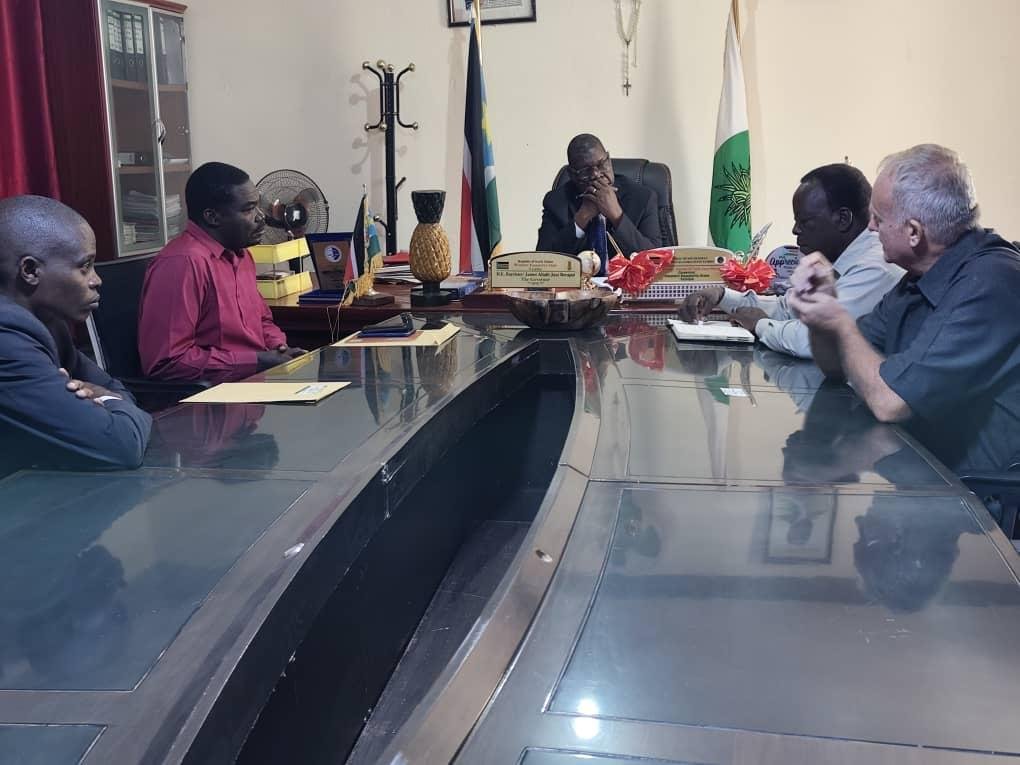A delegation from Equatorial Teak Company based in Nzara County, Western Equatoria State paid a high-profile courtesy visit to the Governor of Western Equatoria State, Barrister James Al Taib Jazz Berapai, on Thursday.
What began as a warm introduction soon turned into an urgent appeal, as the company raised grievances over a land dispute threatening its agricultural projects.
Governor Al Taib, who only recently assumed office one week ago, welcomed the delegation to his office in Yambio and commended their efforts to contribute to the socio-economic development of the region.
He called for unity between the private sector, local communities, and government institutions, urging cooperation to foster peace and sustainable growth.
“We encourage all investors and companies to support the community on the ground. My administration is open to collaboration and we will ensure that the people of Western Equatoria benefit from such initiatives,” the Governor said.
Speaking after the meeting, the delegation leader, Mr. Ian Peterson, praised the Governor for receiving them and expressed the company’s commitment to advancing development in Western Equatoria andSouth Sudan at large.
“It is a great honor to meet you for the first time and to warmly welcome you as the new Governor of Western Equatoria. We are committed to contributing to the development of South Sudan, and I truly hope that one day you and your team will visit us in Nzara County to see the work we are doing and explore ways of working hand-in-hand for the betterment of our community and our country,” Peterson said.
However, Peterson also acknowledged that the visit was overshadowed by pressing challenges the company is facing.
“Your Excellency, I regret to raise this matter at such an early stage of your administration, but we feel compelled to bring it forward. We are facing serious land disputes that not only threaten our operations but also risk undermining agricultural development in South Sudan. We trust in your leadership to give this issue the attention it deserves,” he added.
Another member of the company, Mr. Angel Ngbaya, expanded on the grievance, citing ongoing land encroachment in Nzara County, where the company claims ownership of more than 200 acres of farmland used to cultivate coffee and other cash crops with an obligation of 30 years.
“We are facing significant challenges related to land issues within the Territory of Equatorial Teak Company in Nzara County. We believe this issue deserves serious attention, and we hope to work together with you in finding a sustainable solution,” Ngbaya said.
The company alleges that the land has been illegally occupied by individuals believed to have crossed from the neighboring Democratic Republic of Congo(DRC).
Community reports from Nzara also point to growing tensions between local residents and foreign settlers, raising fears of potential clashes if the issue is not resolved.
Governor Berapai emphasized that his government will not allow disputes over land to destabilize the state, warning that non-citizens must respect South Sudanese laws and the rights of local investors.
“We must ensure that land ownership disputes do not cause problems between companies, communities, and the government. My administration is committed to protecting legitimate investments while safeguarding the interests of our people,” he said.
Land disputes have been a recurring source of conflict in South Sudan, particularly in fertile regions such as Western Equatoria, where agricultural investments often clash with community land rights and cross-border migration.
Analysts note that unresolved land issues not only discourage investment but also risk fueling insecurity in border regions.
The Ministry of Agriculture, the Ministry of Housing Land and Public Utility, and local authorities in Nzara County are expected to follow up on the grievances raised by Equatorial Teak Company.
Observers stress that resolving such disputes will be vital for encouraging private investment in agriculture a sector seen as key to diversifying South Sudan’s oil-dependent economy.
